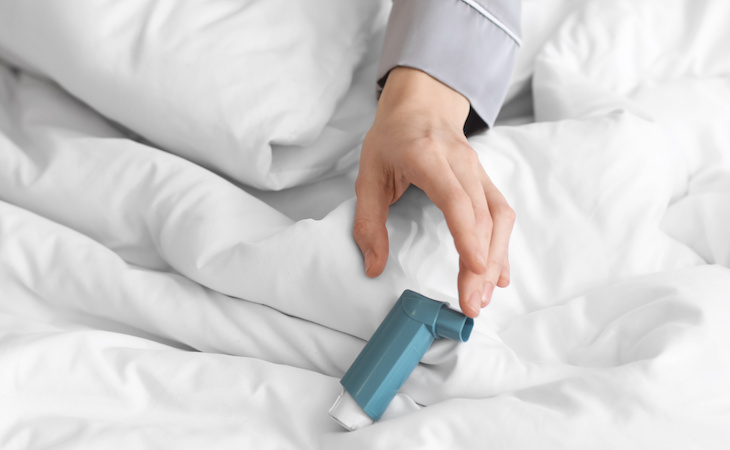The wheezing, coughing, chest tightness, and shortness of breath we know as asthma happens when the bronchial tubes in a person’s lungs become swollen. This makes it hard to move air in and out of the lungs. When the symptoms are worse than usual, it’s called an asthma attack.
Asthma affects an estimated one in 13 people in the United States, and that number is increasing. It has a variety of causes and, fortunately, can largely be controlled with medication and lifestyle changes.
Nocturnal asthma, when asthma symptoms get worse at night, wakes up 75% of people with asthma at least once a week. Some 40% of asthma sufferers experience nocturnal symptoms every night.
This article will explore why asthma symptoms can be worse at night—and what you can do to get better sleep if you have asthma.
Asthma and sleep
Asthma and sleep can be locked in a vicious cycle. Nocturnal asthma can make it difficult to get a good night’s sleep—and missing sleep can make asthma worse. Because sleep loss promotes inflammation in the body, it can reduce lung function and increase the possibility of an asthma attack. Studies show people with asthma who sleep less have more frequent asthma attacks.
This means if you have asthma, sleep should be a priority. It also means properly managing your asthma can help you enjoy the rest you need to function at your best.
What causes nighttime asthma?
Exactly why asthma symptoms get worse at night isn’t fully understood. There are theories, though, including the regular nighttime changes in the body’s hormones connected to its internal clock. Higher body weight can also increase the risk of nocturnal asthma. So can acid reflux or gastroesophageal reflux disease (GERD).
Asthma can disrupt sleep no matter what time of day a person is sleeping. People with asthma who work the night shift can experience breathing problems while they’re sleeping during the day. Research suggests that in some people, breathing becomes more difficult a few hours after they fall asleep—a hint there may be an unknown internal trigger for sleep-related asthma.
There are also well-known triggers of nocturnal asthma—including tobacco smoke, allergens in the bedroom, diet (some people with asthma are sensitive to sulfites in food and beverages like beer, wine, dried fruit, and shrimp too close to bedtime), medications, cold air in the bedroom, and lying in a reclining position. Some of the most common triggers for nocturnal asthma attacks are viral infections such as colds, the flu, and sinus infections.
Asthma and sleep apnea
Obstructive sleep apnea (OSA) is a disorder in which the airways narrow or collapse during sleep. Regular, loud snoring is a typical OSA symptom. So is daytime drowsiness. That’s because OSA causes someone literally to stop breathing and to be “jump-started” by their brain, many times throughout the night. The result is not getting a full, restful sleep.
With their similar symptoms, asthma and OSA seem to be related in that having one of the respiratory conditions makes it likely you’ll also be diagnosed with the other one too. A study of 752 asthma patients who also had OSA found that participants had a higher likelihood of having both daytime and nighttime asthma symptoms. Fortunately, treating OSA can help reduce asthma symptoms as well.
How to sleep better with asthma
Good news for people with asthma: There are steps you can take to reduce the chances asthma interferes with your sleep. Here are some tips to get you started:
- Visit your healthcare provider to work on a treatment plan. Discuss your asthma with a doctor so they can help determine what works best for you. This may include a controller medication and avoiding asthma triggers.
- Use a humidifier in the bedroom. “Cold air is drier and more problematic for persons with severe asthma,” says Max Stevens, owner of the UK-based mattress review site, The Sleep Checklist. He notes that a humidifier moisturizes the air in your bedroom and helps keep dust mites at bay because they thrive in low humidity.
- Keep animals out of the bedroom. “I would recommend that if you have pets, you keep them out of the bedroom so that their dander does not accumulate or adhere to the carpets and bedding,” says Stevens. And yes, this goes for the family cat too. “You may also need to keep your bedroom door closed to keep your cat and its dander out,” says Stevens.
- Reduce bedroom allergens. This one follows not allowing animals in the bedroom. Eliminating, or at least reducing, exposure to dust mites and pest residue can lower the risk of nocturnal asthma. Wash bedding regularly and vacuum and dust weekly. Allergen-proof bedding and pillows can help too.
- Sleep on your left side. Sleeping on your left side can help keep your airways open. This can also help prevent GERD, a potential nocturnal asthma trigger. You may also want to consider putting a pillow between your legs to help keep your spine neutral in this position.
- De-stress before bedtime. Because stress is a common trigger for asthma, it’s best to create a nightly routine that includes activities purposely intended to calm and relax you—such as soft music, a warm bath, or reading.
- Keep asthma medication nearby. It’s important to treat nighttime asthma attacks as part of your overall control strategy. Keep medications and a glass of water nearby for easy access during the night.
FAQs
Can asthma cause sleep problems?
Nocturnal asthma can wreck your sleep and lead to sleep deprivation and an overall poor health-related quality of life. The coughing and difficulty breathing of an asthma flare make it almost impossible to sleep. Although it’s not fully understood why asthma symptoms get worse at night, there are definite triggers best avoided to reduce the chances nocturnal asthma will keep you up at night.
What’s the best sleeping position for asthma?
There are actually three positions considered beneficial for people with asthma. One is to lie on your back with your shoulders and neck elevated with two or more pillows. This can open your airways as you sleep and allow your sinuses to drain.
A second option is to lie on your left side and put a pillow between your legs. This is especially useful if you have GERD because it prevents reflux from your stomach into the esophagus.
A third sleep position can be to lie on your back with your head elevated and your knees bent with a pillow under them. If you like to sleep with your head and shoulders propped up with pillows, you may want to add another pillow under your knees.
Why is my asthma worse when I sleep?
Although high numbers of people with asthma experience nocturnal asthma, its causes aren’t well understood. It may be related to changes in hormones that occur in the evening. High body weight or acid reflux can increase the risk of nocturnal asthma. So can other triggers, such as tobacco smoke, allergens in the bedroom, diet, medications, cold air, and other medical issues.
What’s causing that nighttime cough? Learn about the culprits of nighttime coughing and how to deal with it.




